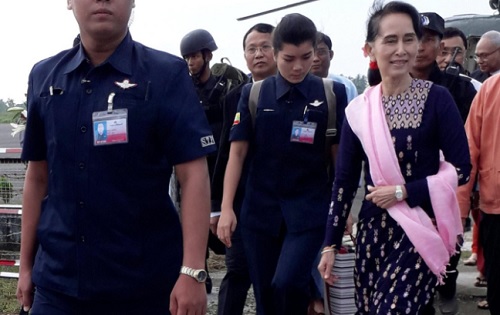SITTWE, Myanmar (Reuters) - Myanmar’s de facto leader, Aung San Suu Kyi, on Thursday urged people “not to quarrel” as she visited areas riven by ethnic violence for the first time since hundreds of thousands of Rohingya Muslims began fleeing the country to escape a brutal military crackdown.

Myanmar's de facto leader Aung San Suu Kyi arrives at Sittwe airport in the state of Rakhine November 2, 2017. REUTERS/Stringer
Reuters photographers saw thousands of desperate Rohingya wade through shallows and narrow creeks between islands of the Naf river to reach neighboring Bangladesh the previous evening.
Some had small boats or pulled makeshift rafts to get to Bangladesh on the river’s western bank, but most walked, children cradled in their arms and the elderly carried on their backs, with sacks of belongings tied to staves on their shoulders.
Reaching the far side, some women and older people had to be pulled through the mud to reach dry land atop steep banks.
More than 4,000 crossed at different points on the river on Wednesday, Major Mohammed Iqbal, a Bangladesh security official in the southern district of Cox’s Bazar, told Reuters.
Over 600,000 Rohingya have fled predominantly Buddhist Myanmar to neighboring Bangladesh since late August to escape violence in the wake of a military counter-insurgency operation launched after Rohingya militants attacked security posts in Rakhine State.
Suu Kyi, a Nobel Peace Prize winner, has faced heavy international criticism for not taking a higher profile in responding to what U.N. officials have called “ethnic cleansing” by the army.
Amid heightened security, she boarded a military helicopter at Sittwe, the Rakhine state capital, to be taken to a village in Maungdaw, the district that has seen the greatest exodus.
“On the road where some people gathered, she stopped the car and talked to everyone,” said Chris Lewa, from the Arakan Project monitoring group, citing a Rohingya religious leader who was present.
“She only said three things to the people - they should live peacefully, the government is there to help them, and they should not quarrel among each other.”
Lately Suu Kyi, who does not control the military, has appeared to take a stronger lead in the crisis, focusing government efforts on rehabilitation and pledging to repatriate refugees.
Suu Kyi had not previously visited Rakhine since assuming power last year following a landslide 2015 election victory. The majority of residents in the northern part of the state, which includes Maungdaw, were Muslims until the recent crisis.
Leave Comments